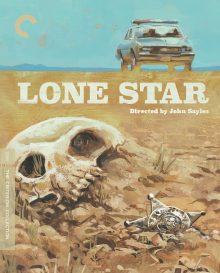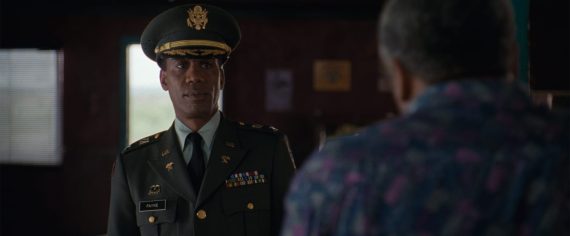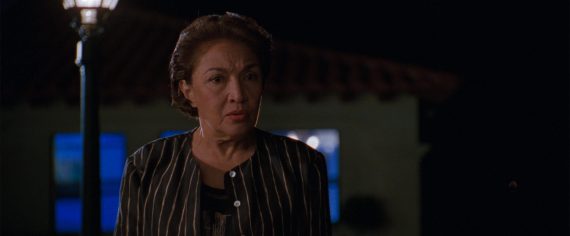 Director: John Sayles
Director: John Sayles
Screenplay by: John Sayles
Starring: Chris Cooper, Elizabeth Peña, Joe Morton, Clifton James, Miriam Colon, Kris Kristofferson, Matthew McConaughey
Country: USA
Running Time: 135 min
Year: 1996
BBFC Certificate: 15
John Sayles is a fiercely independent filmmaker who, like John Cassavetes before him, would raise money for his personal projects by working on commercial fare in between. Whereas Cassavetes would act in ‘bigger’ films, Sayles would write on spec. He started out working for Roger Corman, writing scripts for the likes of Piranha and Battle Beyond the Stars, before moving on to working as a script doctor on blockbusters such as Apollo 13. The money for these would help him raise the funds to make critically adored films like Matewan and City of Hope.
Sayles’ post-2000 work didn’t attract quite as much acclaim and he’s only directed two films since 2010, which is a shame, but he’s written a trio of novels during this time and he’s now in his 70s, to be fair.
Sayles wrote, directed and often edited quite a collection of highly regarded films during the 80s and 90s though and in 1996 he released what some believe is his finest work, Lone Star. It’s a title I saw back on its initial VHS release, when I was first getting more seriously into films. It blew me away back then, aided by it being one of the first mature dramas I’d watched and appreciated.
I’ve hung on to my VHS tape all these years, because the film, along with most of Sayles’ output, has been poorly served on disc in the UK. As far as I’m aware, Lone Star never even made it to DVD in this country and Matewan is the only title of Sayles’ I know of that’s been released on Blu-ray over here.
Well, Criterion should be applauded for finally digging Lone Star out of its shallow grave and not only bringing it out on Blu-ray but also polishing it up for a UHD release. Needless to say, I leapt at the chance of reviewing it (the Blu-ray that is. I’m still waiting for 4K projectors to come down in price to upgrade).
Lone Star opens with the discovery of a skeleton, a decayed sheriff’s badge, a mason’s ring and an expended bullet just outside of the Texan border town of Frontera. All signs point towards the body being that of Charlie Wade (Kris Kristofferson in flashbacks), a notoriously corrupt, racist and brutal sheriff who went missing one night, back in 1957, along with $10,000 in county funds.
Sam Deeds (Chris Cooper) is the current sheriff who is put in charge of solving the murder. The trouble is, the chief suspect is his own father, Buddy Deeds (Matthew McConaughey in flashbacks), who died recently and was much beloved by the community when he himself was sheriff.
As the case moves on, Sam faces several moral dilemmas. Whilst he didn’t get on with his father and hated the fact he was such a local legend, he’s still wary about dragging his name through the mud, particularly as Wade was hated by all and perhaps deserved his fate. He’s not getting much support from the mayor either, Hollis (Clifton James), who worked alongside Buddy and thought appointing this local celebrity’s son as sheriff would do him some political favours.
Being back in his old home town and delving into his past, Sam is also drawn to rekindle the flame he held for Pilar (Elizabeth Peña) back when they were teenagers. They were pulled apart by their parents back in the day and Sam’s investigation opens up old wounds.
Meanwhile, another former resident of Frontera, Colonel Delmore Payne (Joe Morton), is assigned to the town’s nearby military base. He also has skeletons in his closet back home, as his estranged father Otis “Big O” Payne (Ron Canada) stills lives there. Delmore lost touch with him after Otis abandoned him and his mother back in the day. A shooting incident at Otis’ club, involving soldiers from the base, helps their paths cross.
Tensions also mount in the town, as the white Anglo-American locals rally against Pilar’s school for teaching more in-depth versions of Texas’ dark history to their children.
There are some other strands included in the film too, which I won’t list here but, in brief, Sayles has crafted a richly layered tapestry. These threads are all intertwined so naturally and effectively too. Without wanting this to sound derogatory, it reminded me of some modern TV series – the better ones, I mean, such as The Wire or The Sopranos, where you move between numerous characters and stories without losing the overall thread or theme. It’s done here in a much shorter length of time but it never feels like things are being skimmed over. It’s so deftly controlled and intelligent.
The film’s themes are rich too. A number of ideas are explored but it never becomes overwhelming because these themselves are intertwined. Most notably, the film examines the importance of perspective on stories and the concept of legends. These fit perfectly with Sayles’ exploration of tensions and borders between races, classes and family members.
The central murder mystery plot and romance between Sam and Pilar help ground these ideas in a compelling story. Further drawing us into this is a superb cast. Sayles regulars Cooper and Morton provide further proof that they’re two of Hollywood’s most underrated actors. Peña provides the film’s heart and soul. Kristofferson makes a terrific villain and McConaughey impresses in a relatively early, small but memorable role.
The film looks gorgeous too. Stuart Dryburgh was the DOP and he makes great use of the Texan locations, eliciting memories of classic westerns. Particularly impressive is the way he and Sayles transition scenes from the present day to the past, in the regular flashbacks. Rather than using special editing transitions or filters, the camera pans across a scene, unveiling the past as it moves further around. It’s done so beautifully, you wouldn’t know there would have been grips and assistants dragging props out of the way and cast members reshuffling during the graceful camera moves.
Overall, Sayles’ film is a rich and deeply fulfilling drama exploring various themes still strongly relevant today. Beautifully shot and performed, it’s a wonderful film that impressed me as much now as it did when I first saw it nearly 30 years ago.
Film: 




Lone Star is out on 26th February on UHD and Blu-Ray in the UK, released by The Criterion Collection. The film looks incredible, with sharp details and beautifully natural colours and tones. It sounds crisp and clear too.
DIRECTOR-APPROVED 4K UHD + BLU-RAY SPECIAL EDITION FEATURES
– New 4K digital restoration, supervised by director John Sayles and director of photography Stuart Dryburgh, with 2.0 surround DTS-HD Master Audio soundtrack
– One 4K UHD disc of the film presented in Dolby Vision HDR and one Blu-ray with the film and special features
– New conversation between Sayles and filmmaker Gregory Nava
– New interview with Dryburgh
– Trailer
– English subtitles for the deaf and hard of hearing
– PLUS: An essay by scholar Domino Renee Perez
The conversation between Sayles and Gregory Nava is well worth a watch. Sayles discusses his inspirations behind the film as well as his working practices. It’s an illuminating watch, though Nava gushes a little too much at times.
Stuart Dryburgh provides an 18-minute interview. He talks of his excitement about being offered the project, as well as detailing his approach and influences. He also talks generally about his memories of being on set and his thoughts on the film. It’s a strong piece.
I didn’t receive a copy of the booklet, unfortunately.
So, whilst there isn’t a vast amount of supplemental material here, what is included is of a high quality and the film is strong enough to warrant a high recommendation. Let’s hope Criterion turn their attention to more of Sayles’ films.
Disc/Package: 











Leave a Reply